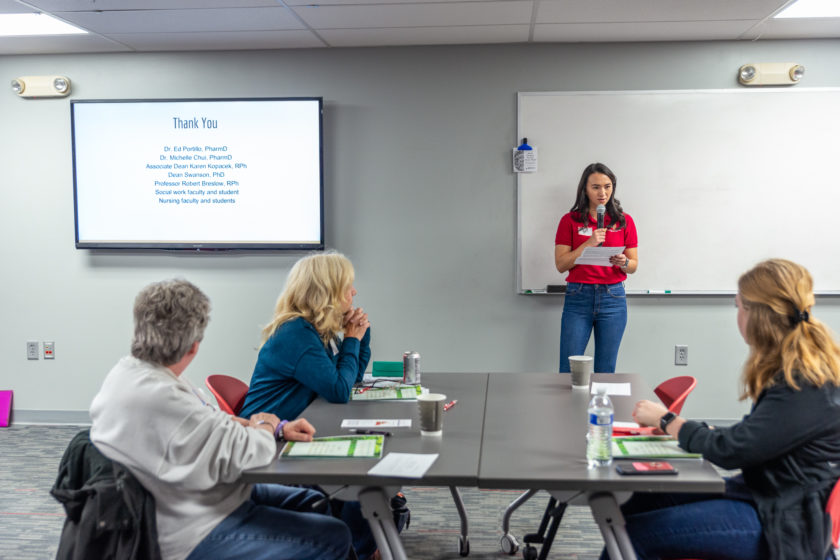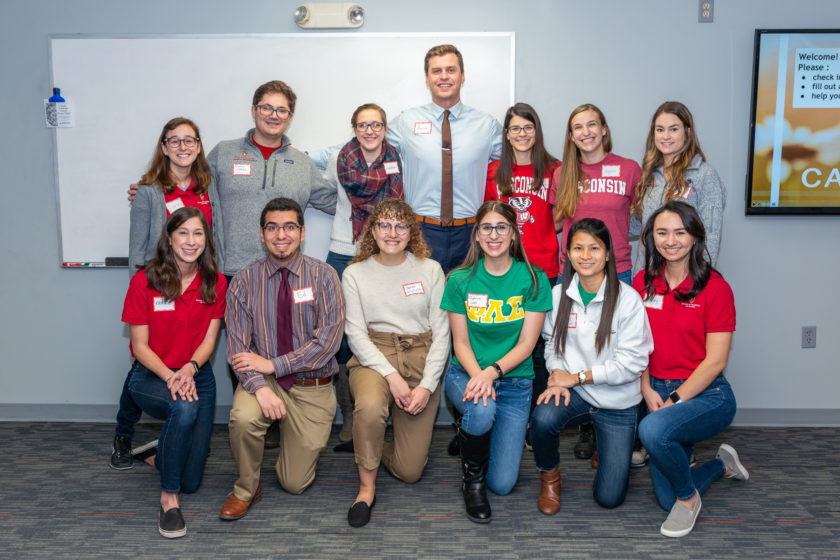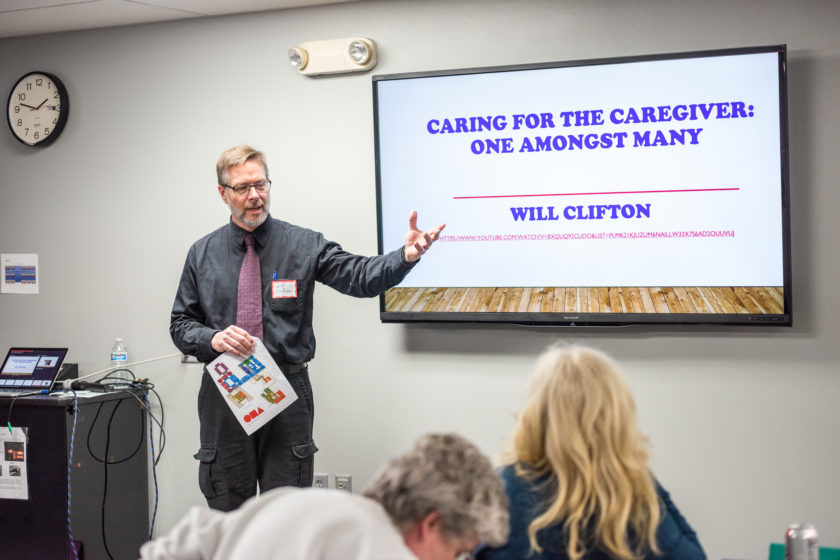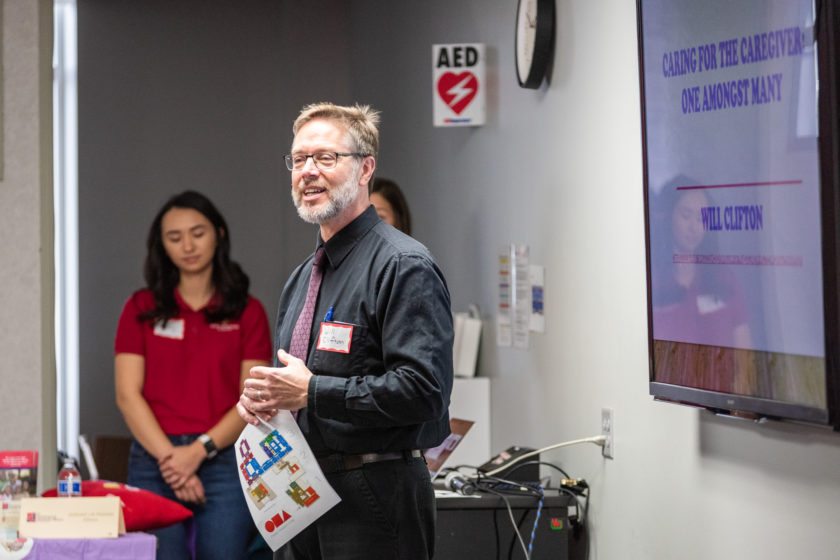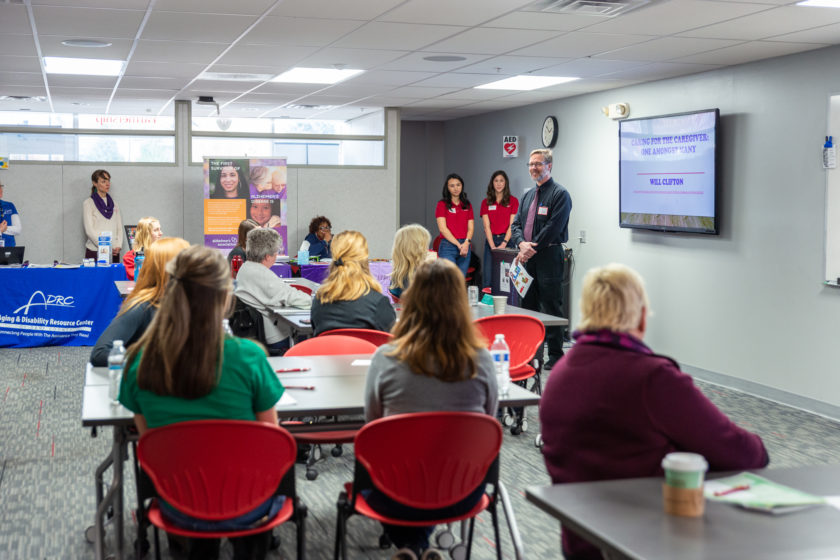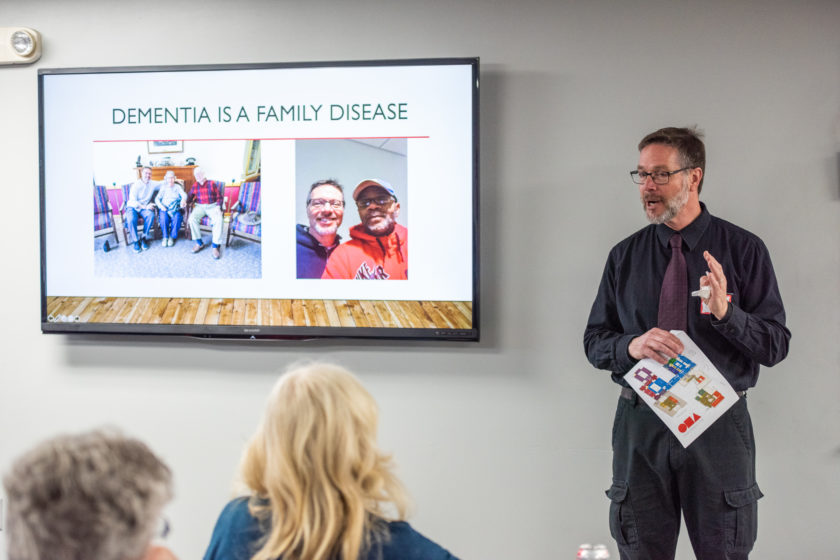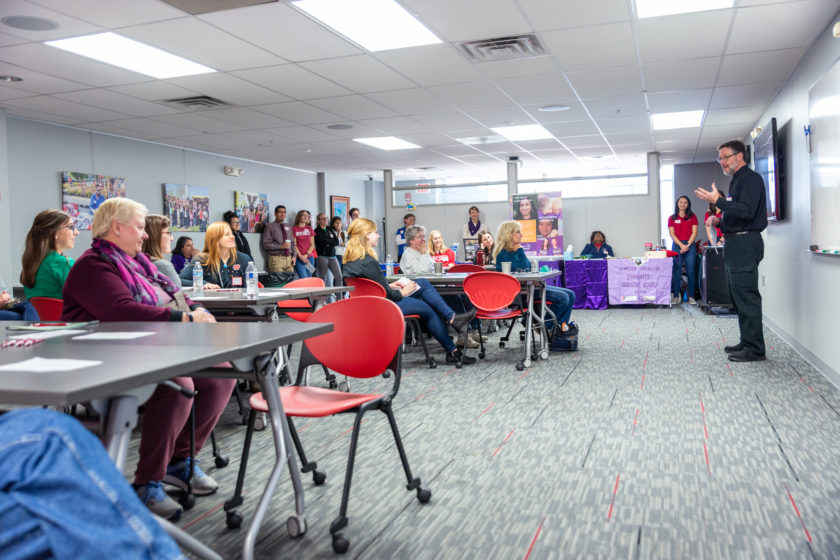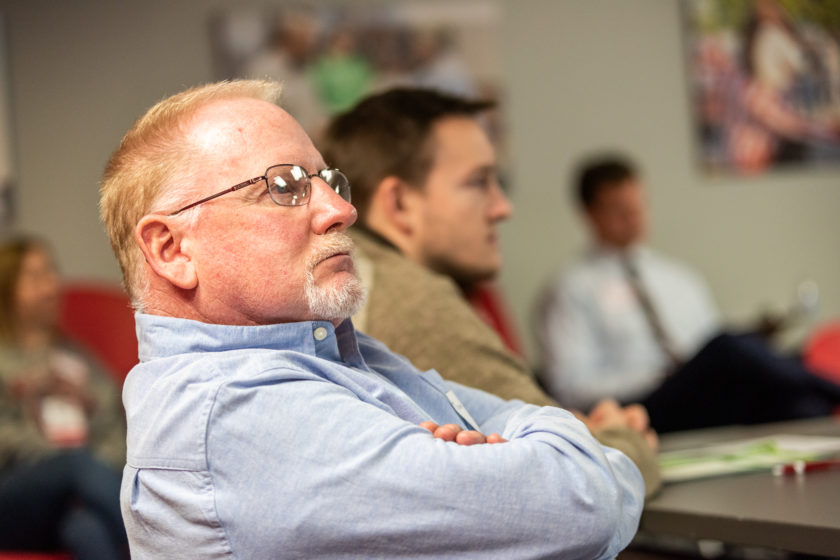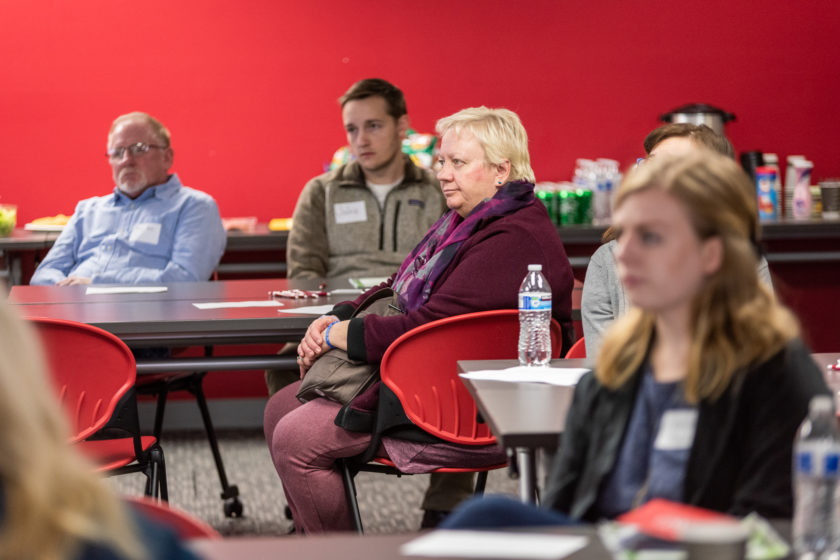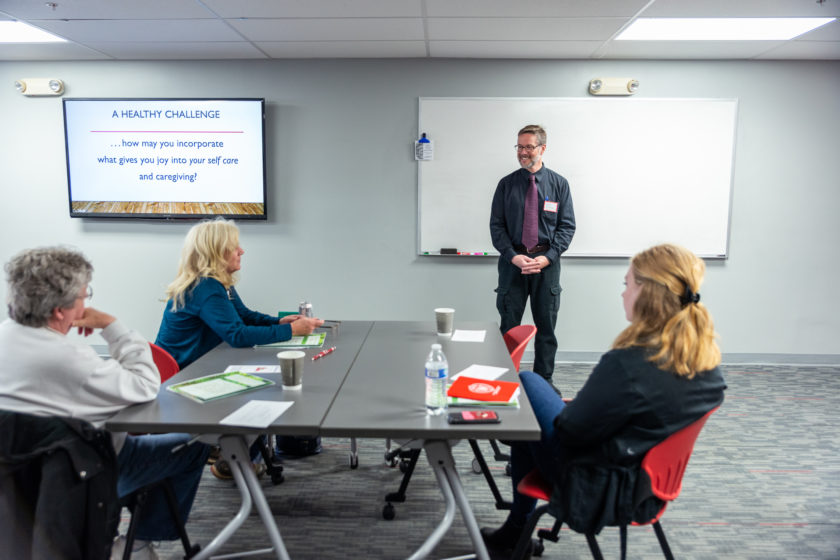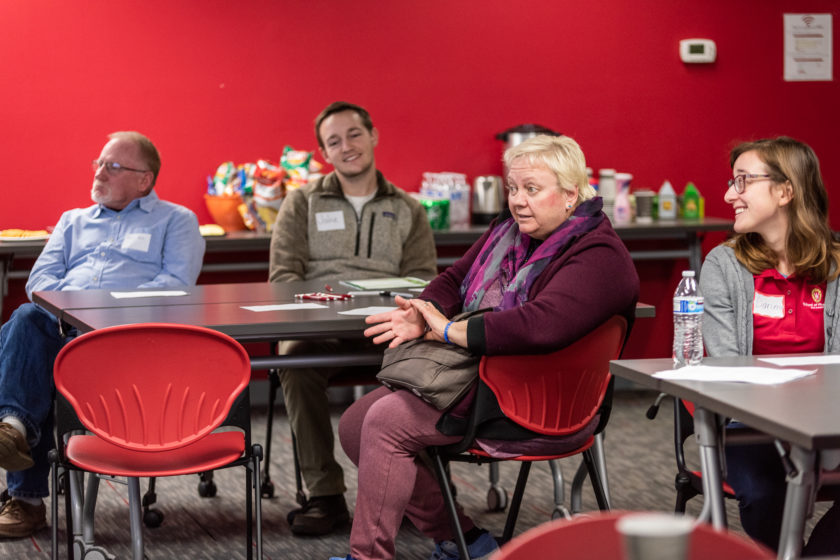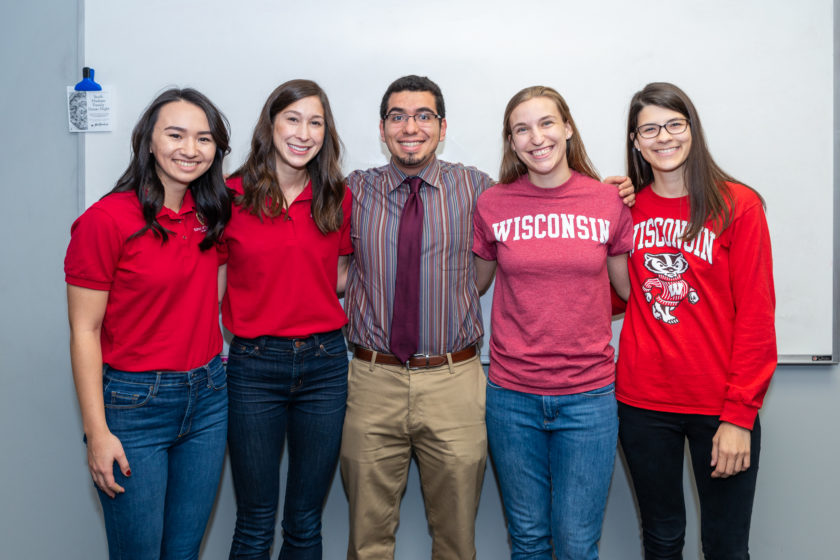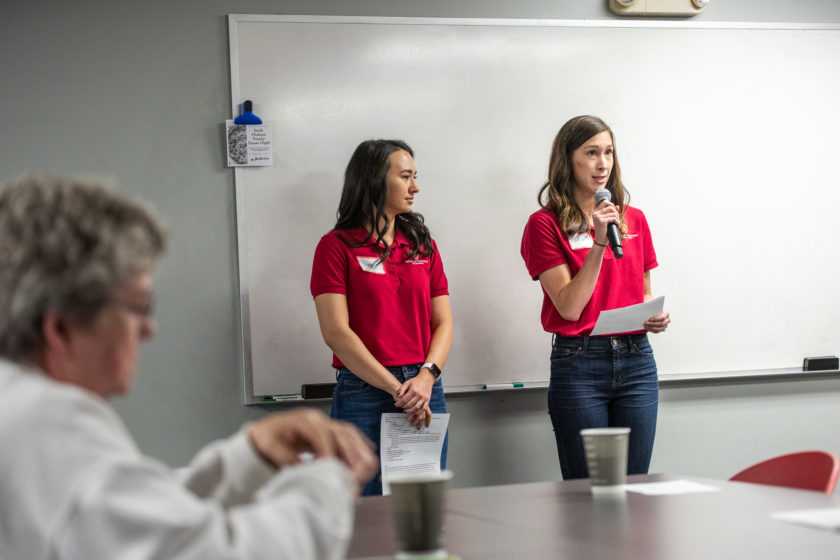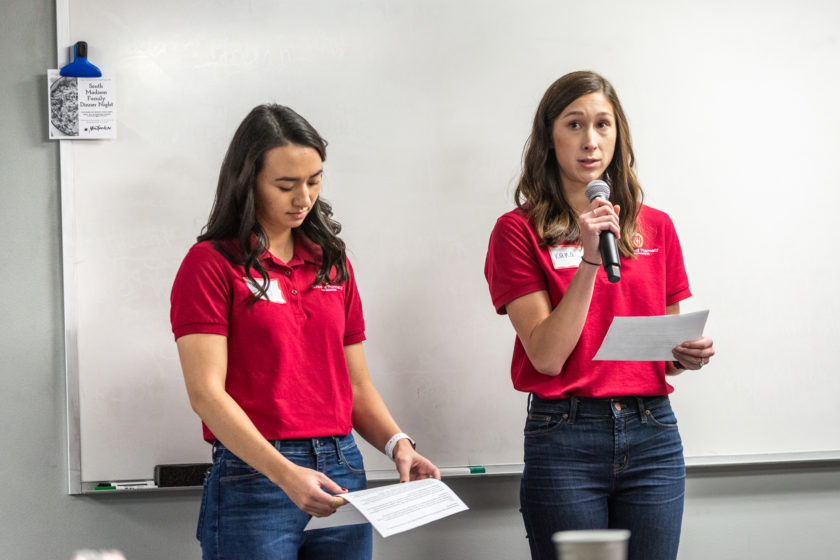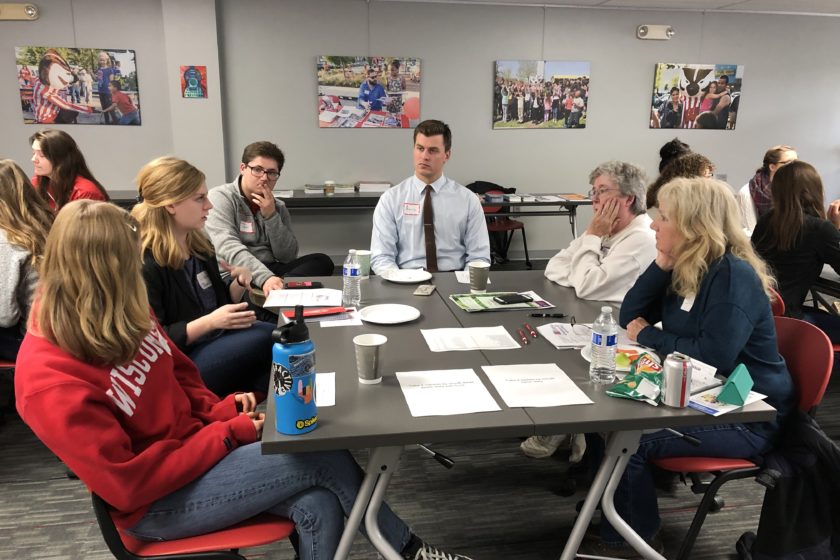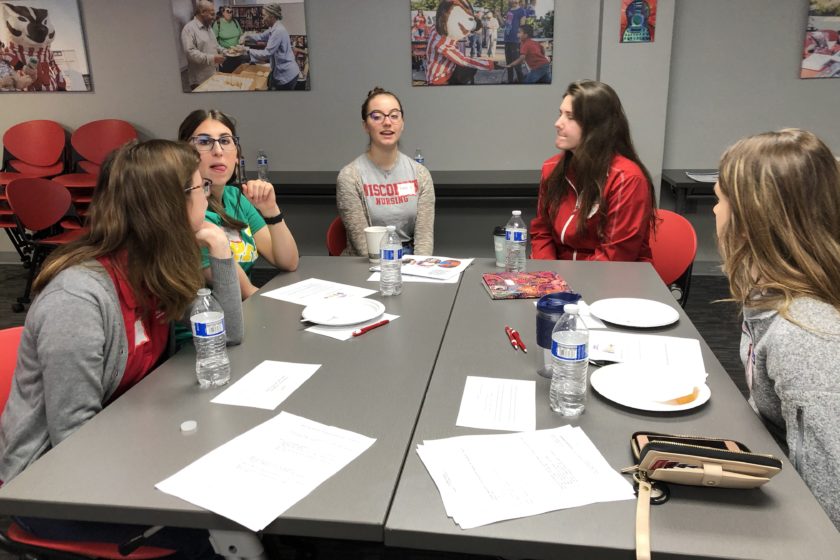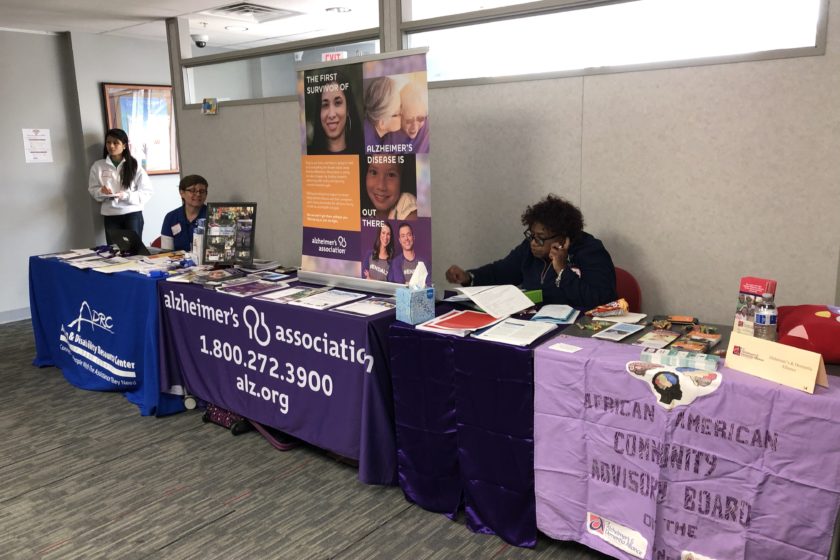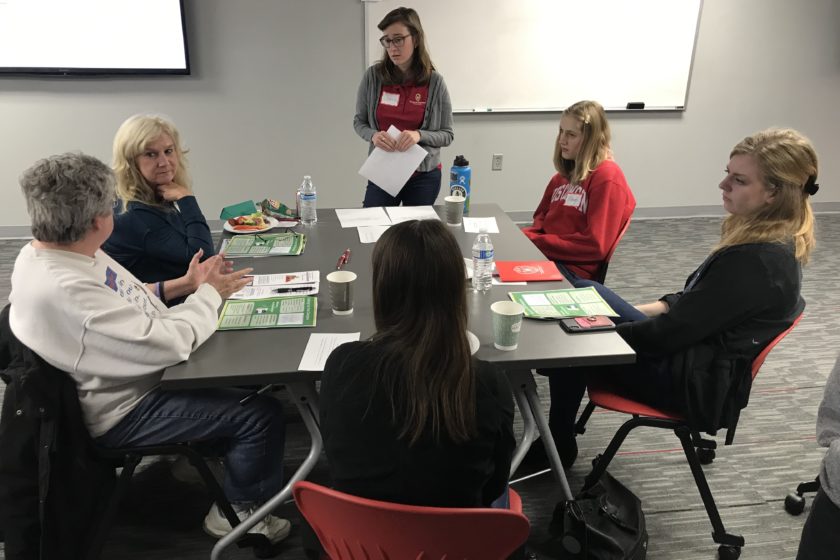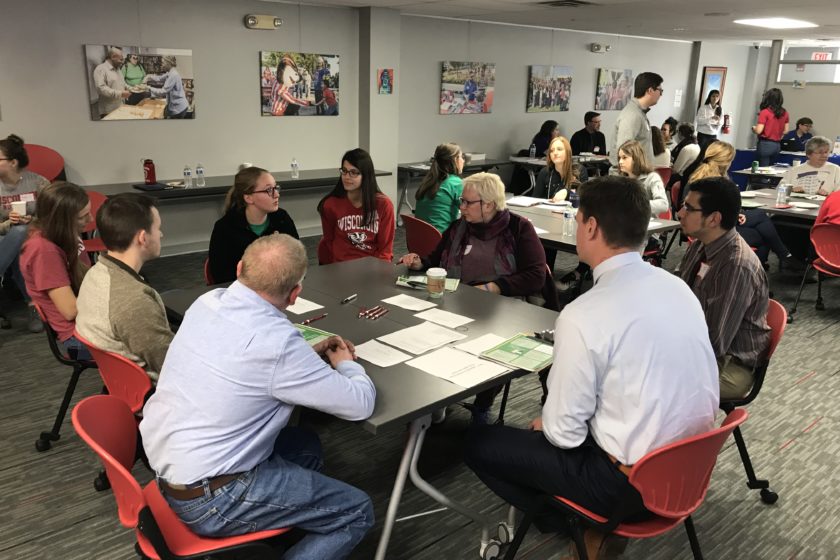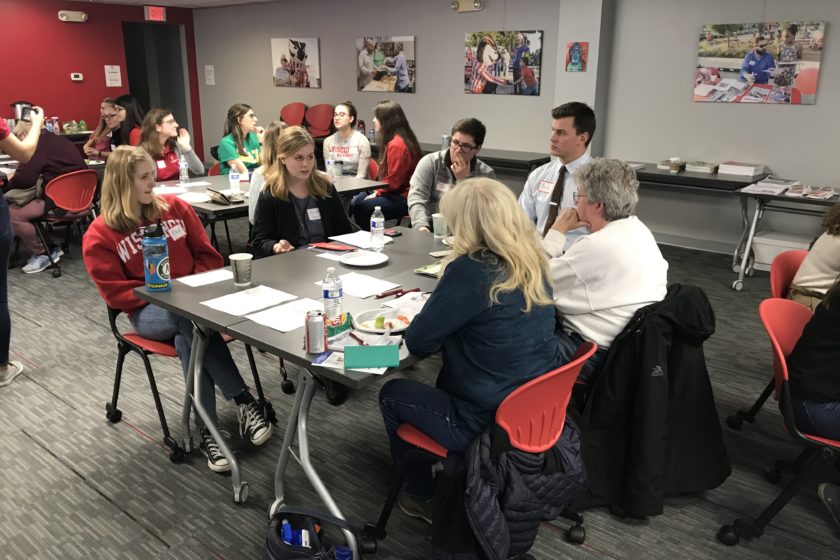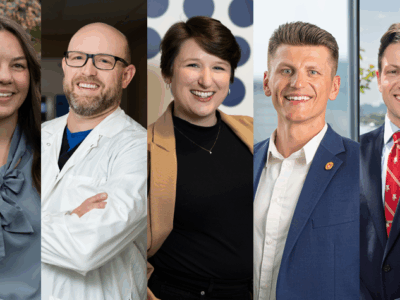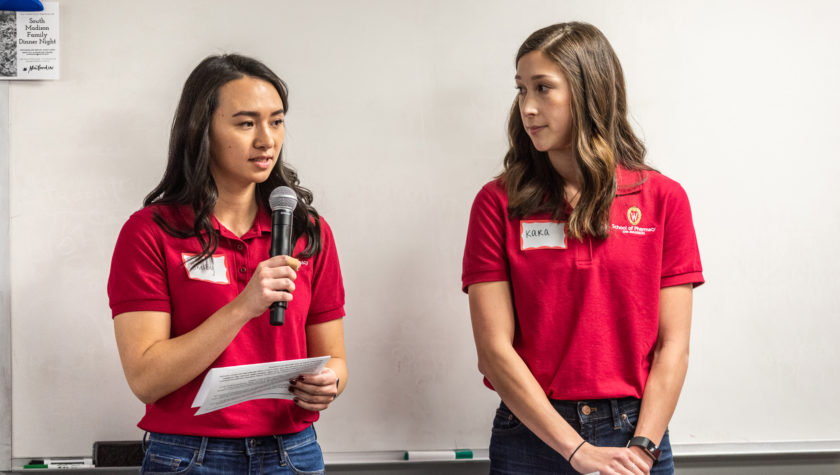
6
December

After winning national leadership award, PharmD student-led trainings educate and empower Alzheimer’s caregivers
By Mary Magnuson
Photos by Ingrid Laas & PLS students
Nearly one in five adults in the United States provides unpaid assistance to an older adult. The unpaid care provided to patients with Alzheimer’s disease or other dementias alone was worth an estimated $217.7 billion in 2014.
These unpaid services can include everything from supporting personal hygiene to monitoring the patient’s condition and managing medication. But these family caregivers, who spend an average of nearly 22 hours per week providing care, often may be untrained and feel unprepared to manage complex conditions, medication routines, and the mental load of being a care provider.
PharmD students in the University of Wisconsin–Madison School of Pharmacy’s Phi Lambda Sigma (PLS) student organization had an idea to help caregivers succeed through an in-person training that would not only walk through some techniques for safe medication adherence and administration, but also where to find community resources for additional support and how to preserve their own wellbeing.
“We’re hoping that through this training, caregivers realize that, as important as it is to take care of their loved ones, it’s also important for them to take care of themselves,” says PLS president Kara Mudd, third-year PharmD student.
“This is just one example of how they’ve applied leadership not only as students in the School but as innovators in the community.”
—Ed Portillo
The students’ proposal for the event won the national PLS Charles Thomas Leadership Challenge Award, which secured them funding to make the training a reality.
“These student pharmacists demonstrate their ability as leaders every day,” says Ed Portillo (PharmD ’14), assistant professor in the School’s Pharmacy Practice Division and faculty advisor to PLS. “This is just one example of how they’ve applied leadership not only as students in the School but as innovators in the community.”
Using self-care to improve patient care
Mudd and Shelby Koen, third-year PharmD student and PLS secretary, said nearly two years of planning went into the event, called Caring for the Caregiver, which was held in the South Madison Partnership building in November.
The training was a collaborative endeavor between students from the UW–Madison School of Pharmacy, School of Social Work, and School of Nursing to offer an interdisciplinary training program for caretakers of patients with Alzheimer’s disease.
The event began with a keynote speaker, Will Clifton, a member of the UW Initiative to End Alzheimer’s Board of Visitors, who spoke about his own experience as a family caregiver to his parents, both of whom have Alzheimer’s disease.
After Clifton’s talk, participants began a series of roundtable discussion, each facilitated by either a pharmacy, nursing, or social work student: The pharmacy students led discussions about medications and disease state topics, nursing students spoke about community resources and how nurses can help, and the social work students started conversations about how to keep patients safe in the home and how caretakers can maintain a sense of well-being.
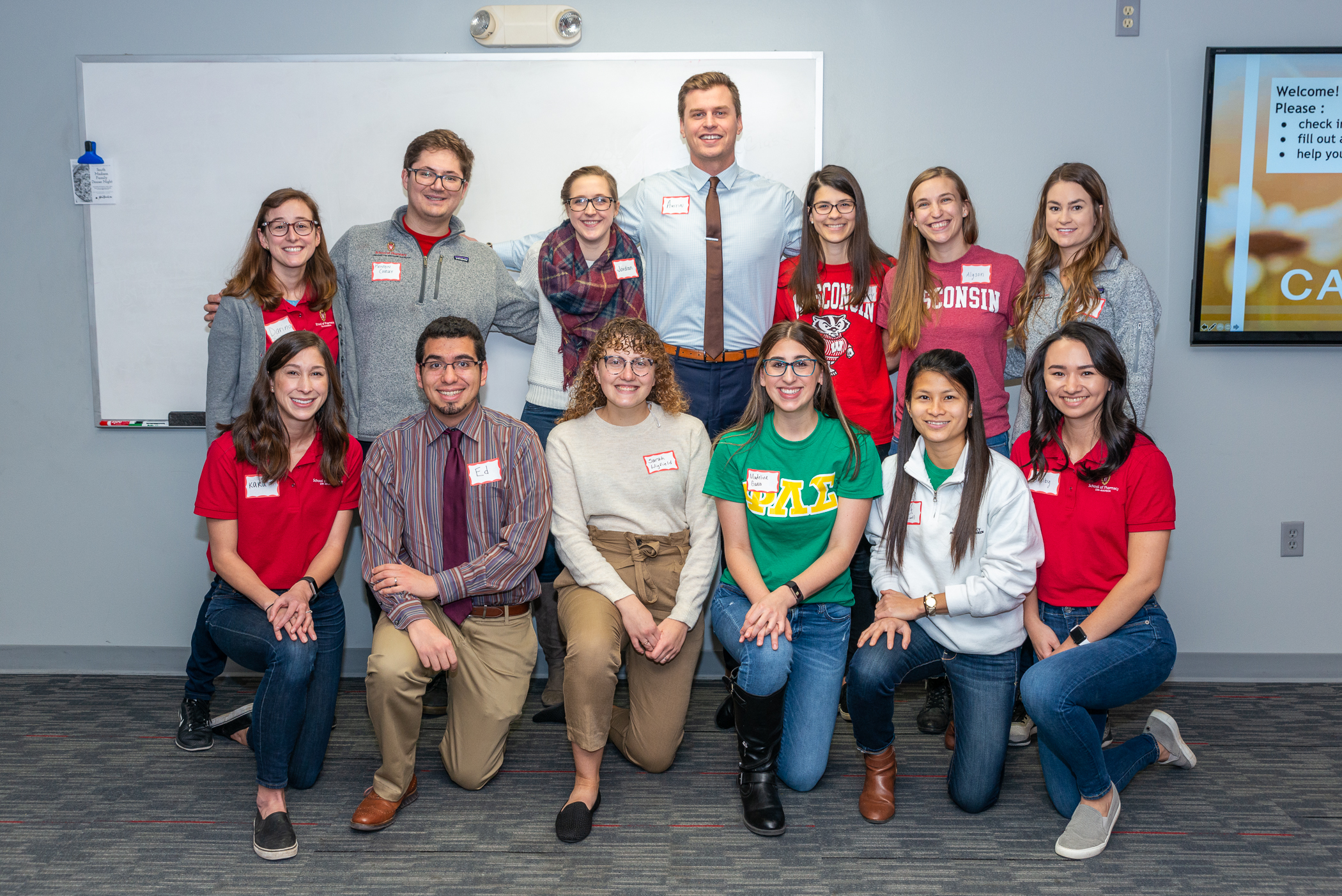
“Through the roundtable discussions, our goal is not just to give them information, but to also learn and respond to what they want to get out of the event,” Koen said. “The discussions also helped the caregivers learn from each other and exchange tips or challenges from their own experiences.”
Along one wall of the meeting room, local and national organizations also set up booths to share information about mental health and support networks for family caregivers.
“I think it went really well,” says Nicole Fox, a student in the School of Social Work who helped facilitate discussions. “It was a very interdisciplinary and collaborative program, and I think it really played on what caregivers are needing.”
The interdisciplinary nature of the event left its impact on participants, too. In a follow-up survey about the effectiveness of the training, several attendees remarked that it was impactful to have several health professions sharing their perspectives.
“To have social workers, nurses, and pharmacy students in the same room and conversations — very memorable,” wrote one participant, while another said they enjoyed having the various professions sharing their abilities.
Overall, the attendees and organizers felt the event was a success, particularly in the sense that it opened up a dialogue not only between family and formal caregivers, but also among the family caregivers themselves.
“We think that we were able to create a positive and unique experience for the attendees by providing them with the opportunity to share their own stories,” says Mudd.
Becoming collaborative leaders
The previous executive board of PLS, Lindsey Skubitz and Alyson Prom, drew up the proposal in 2018 but began their fourth-year Advanced Pharmacy Practice Experience rotations, which take students to pharmacies and hospitals around the state, shortly after winning the grant. Koen and Mudd inherited the project as the new chair and vice chair of the organization, new members pitched in, and several alumni and former PLS members — including Sydney Steiner (PharmD ’19), Magdalena Siodlak (PharmD ’18), and Ryan Simonet (PharmD ’18) — returned to help the event come together.
“Even members who just recently joined PLS are really passionate about helping these caregivers,” Koen said. “And many of our fourth-year members, who are out on their Advanced Pharmacy Practice Experience rotations, built time into their schedule to remain heavily involved.”
Several professors in the School of Pharmacy also helped mentor the students throughout the process to lend their expertise, including Portillo, Associate Professor and Vice Chair of the Social and Administrative Sciences Division Michelle Chui, and Pharmacy Practice Division Associate Professor Robert Breslow.
Chui says she is impressed with the initiative and motivation of the students because, though pharmacy students have to complete longitudinal group projects as part of the curriculum, independently organizing this interdisciplinary training for community members was on a whole other level.
“We’re hoping that through this training, caregivers realize that, as important as it is to take care of their loved ones, it’s also important for them to take care of themselves.”
—Kara Mudd
“They have been the instigators of every stage of this of this project,” Chui says. “I would say that our influence, as faculty mentors, is very small compared to what students have actually done on their own.”
The most valuable part of this project for the students is gaining experience in the roles of a pharmacist that fall outside of typical expectations and in learning how to engage with other medical professions for holistic patient care, Chui says. And while many students might have seen the training as a steppingstone to a pharmacy residency, she hopes it also helped some understand the wide breadth of career options within the field.
“This is the perfect skill set for individuals who might want to go to graduate school and think about building programs like this that they could then evaluate and scale up to potentially make a broader difference in our patient population,” Chui says.
A broader impact
PLS hasn’t yet decided on whether they will repeat the event next year, but they will be visiting a memory care café, hosted by the Alzheimer’s and Dementia Alliance of Wisconsin, to present an abbreviated version of the training to caregivers and their loved ones during the Spring 2019 semester.
Additionally, they are preparing to make the information available to help family caregivers beyond Wisconsin.
Mudd and Koen are creating a toolkit of all the materials they used to host the program to share with PLS chapters across the country as well as the national Alzheimer’s Association, to support those who are interested in replicating the training. This toolkit will include their approach, timeline, communications guidelines, materials and resources, and any tips or advice they have for groups hoping to host this event.
Portillo says the toolkit will allow them to continue their work into the future and keep making a difference on patients and caregivers.
“I think this is just the beginning for them,” Portillo says. “They’re just a phenomenal, phenomenal group of students.”


